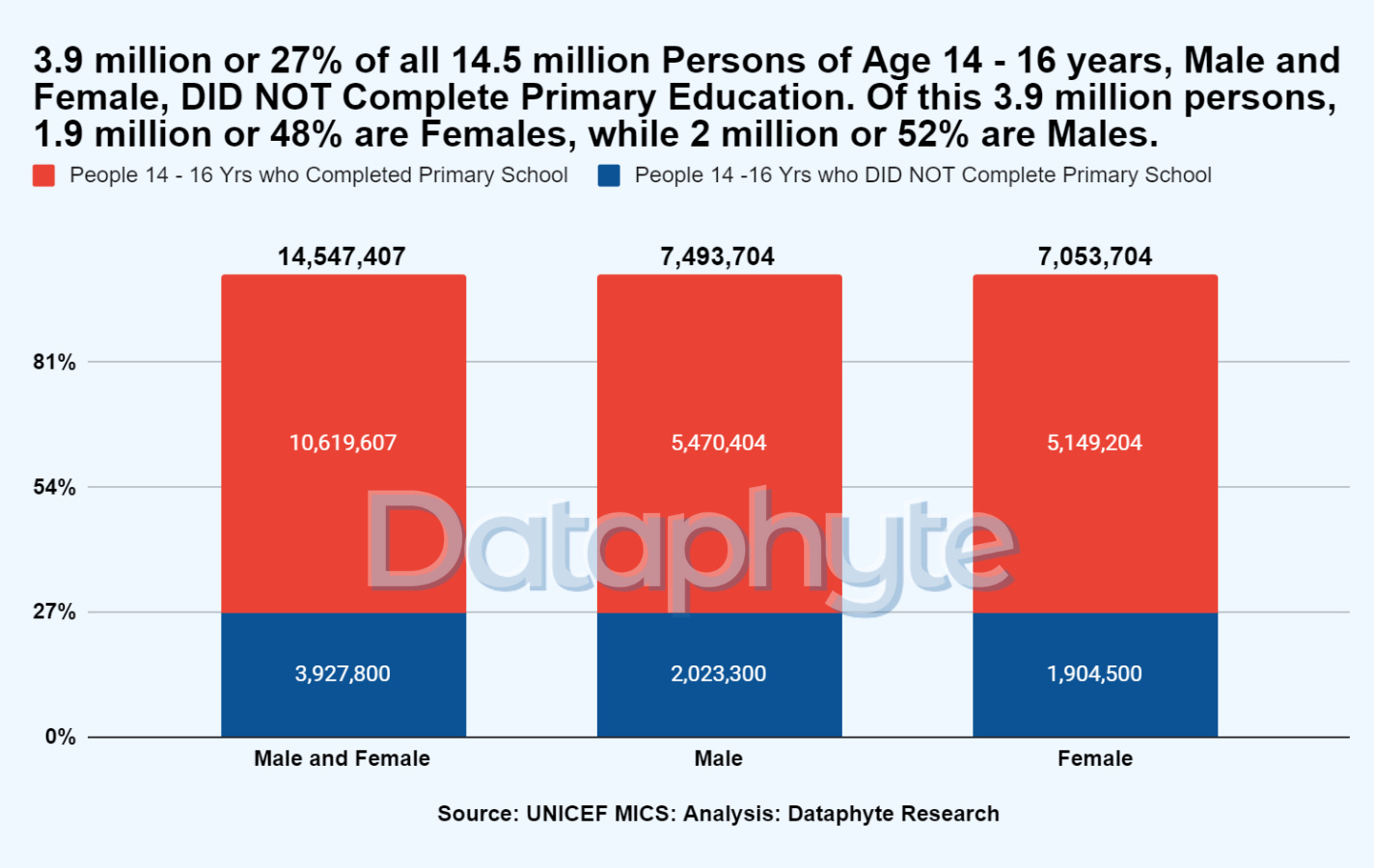In Nigeria, 3.9 million or 27% of the 14.5 million persons between ages 14 - 16 years did not complete Primary Education, an analysis of the UNICEF 2023 Fact sheet reveals.
Of these 3.9 million persons, 1.9 million or 48% are Females, while 2 million or 52% are Males.
Some of the factors responsible for the number of out-of-school children are poverty, bias against formal education, unaffordability of education, crisis, and family preference.
It is estimated from the fact sheet that there are 7.5 million male children and 7.1 million female children who should have had or completed their primary education.
Of these, 5.5 million male children completed their primary school education compared with 5.1 million females.
This leaves out 2 million males, a 27% of 7.5 teen males who did not complete their primary education and 1.9 million females, also 27% of 7.1 teen females who did not complete primary education.
According to UNICEF, access to primary education is a basic right for every child. An effective primary education can build a solid foundation for a children’s development and open avenues for their future success.
With its profound implications on both the individual and society, primary education plays a crucial role in reducing extreme poverty and promoting social changes.
Research shows that a lack of attention to the number of out-of-school children will lead to slower economic growth and reduced income, gender disparity, and child mortality rates in communities will soar.
Meanwhile, UNICEF advised that out-of-school children are among the most vulnerable and face a high risk of forced child marriage, child labour, and recruitment into armed groups. These children are not only denied their right to education but also their right to safety, health, play, and future opportunities.
Incomplete Primary Education: Begins with Out-of-School Children
The prevalence of out-of-school children is the first indicator of non-completion-rate in primary, junior secondary, and secondary schools.
Nigeria’s 27% primary school non-completion rate is an offshoot of its 26% out of primary school rate.
Here, Nigeria has the 6th highest proportion of out-of-primary school children in West Africa.
The Country with the highest percentage of out-of-school children is Mali with 44%. Niger Republic comes second tops with 40% out-of-primary school children, and Burkina Faso, third, with 32%.
Countries with the least number of out-of-primary school children are Togo with 1%; Benin with 5% and Cote D’Ivoire with 6% of primary school children.
The Girl Child: Violence, Gender Bias and Poverty
A World Bank research shows that factors hindering the enrollment of children in schools also contribute to the number of out-of-school children.
A United Nations Girls Education Initiative (UNGEI) document also estimates that about 246 million children experience violence globally in and around school every year. This discourages girls from embracing and completing education. Oftentimes, girls have to walk long distances to school placing them at an increased risk of violence journeying to and fro school while many experience violence while at school.
Besides this, ‘‘Gender biases within schools and classrooms may also reinforce messages that affect girls’ ambitions, their perceptions of their roles in society, and produce labour market engagement disparities and occupational segregation.’’
The UNGEI added that poverty is one of the most important factors for determining whether a girl can access and complete her education. Family income might be a barrier for the girl child to pursue her dreams.
Girl-child education goes beyond getting girls into school. It is also about ensuring that girls learn and feel safe while in school; have the opportunity to complete all levels of education, acquire the knowledge and skills to compete in the labour market; gain socio-emotional and life skills necessary to navigate and adapt to a changing world; make decisions about their own lives; and contribute to their communities and the world.
Importance of Girls Education for Sustainability
The United Nations recommends that the number of out-of-school children should be reduced, especially that of the female child. It says that only 49 per cent of countries have achieved gender parity in primary education.
Access to primary education is a basic right for every child. An effective primary education can build a solid foundation and open avenues for future success. With its profound implications on both the individual and society, primary education plays a crucial role in reducing extreme poverty and promoting social changes.
The UN recommends that ‘‘Investing in girls’ education transforms communities, countries and the entire world. Girls who receive an education are less likely to marry young and more likely to lead healthy, productive lives. They earn higher incomes, participate in the decisions that most affect them, and build better futures for themselves and their families.
Girls’ education strengthens economies and reduces inequality. It contributes to more stable, resilient societies that give all individuals – including boys and men – the opportunity to fulfil their potential. It’s also about girls feeling safe in classrooms and supported in the subjects and careers they choose to pursue – including those in which they are often under-represented.
However, the Sustainable Development Agenda acknowledges the importance of primary education in Goal 4 which stipulates that by 2030, the world should ensure inclusive and equitable quality education and promote lifelong learning opportunities for all, including a target on universal access to primary education.
Thanks for reading this edition of SenorRita. It was written by Kafilat Taiwo and edited by Oluseyi Olufemi.






